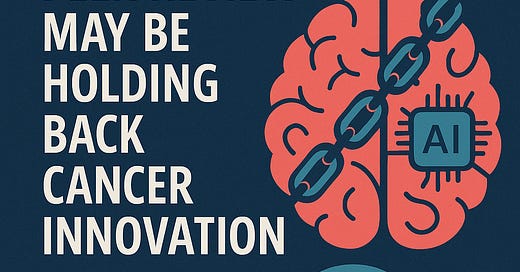My Intra-Tumoral Chlorine Dioxide Therapy has now accumulated nearly 20 documented cases, including in human and veterinary patients, showing a consistent mechanism of action. However, my preclinical research report has been rejected by more than ten peer-reviewed journals — most of them desk rejections by editors without sending it to review. Recently, some individuals have even claimed that my therapy lacks credibility simply because it hasn't been published in a peer-reviewed journal. That’s laughable. As if peer review itself were the standard for truth. I believe it’s time to state this clearly: I stand in open opposition to the current peer review system.
In the world of scientific publishing, peer review is often seen as a gatekeeper of quality — the sacred process by which truth is filtered from speculation. But what happens when this gatekeeping starts suppressing real breakthroughs, especially in medicine?
As the inventor of a novel therapy that directly injects chlorine dioxide (ClO₂) into solid tumors — a protocol that’s now saved lives and visibly dissolved tumors in days — I’ve come to see the peer review system not as a guardian of integrity, but increasingly as a bottleneck, one that rewards safety in career over boldness in science.
1. Peer Review Rewards Conventional Thinking
Peer reviewers are often researchers entrenched in existing paradigms. They are trained to uphold established frameworks, and their careers often depend on defending these frameworks. When confronted with something outside the norm — like a therapy that challenges pharmaceutical pathways, doesn’t require hospitalization, and has no systemic toxicity — the reflex isn’t curiosity. It’s rejection.
2. Editors Protect Their Institutional Interests
Even before peer reviewers see a manuscript, many journals perform “desk rejections.” Editors, often aligned with the business models of large publishers or beholden to institutional expectations, screen out anything too controversial. I’ve personally experienced this: despite submitting compelling data and case results, my work was rejected without review.
3. It Fails the Urgency Test of Medicine
Patients are dying daily. For therapies that can be verified visually and radiologically — like tumor collapse within 7 days after ClO₂ injection — we shouldn’t need to wait years for theoretical validation. If the effect is observable, repeatable, and safe, then patients and doctors should have the right to explore it now.
4. Innovation Now Lives Elsewhere
Preprints, open science platforms, patient collectives, and real-world observational case documentation are becoming the new currency of innovation. My own platform — through Substack and global clinic partners — has done more to build public trust, reproducibility, and global collaboration than any single academic journal ever could.
5. It’s Time for a Parallel System
We don’t need to destroy peer review. But we do need an alternative pathway: one where direct clinical observation, patient outcomes, and mechanistic clarity can be presented, debated, and built upon openly — without waiting for political, institutional, or pharmaceutical gatekeepers to approve it.
I will continue to document and publish every result. I will welcome critical feedback from practitioners, engineers, and patients. But I no longer believe the traditional peer review process is the gold standard. In fact, for radical cancer innovation, it may be the single biggest obstacle.
6. AI Is the Catalyst That Will Replace Peer Review
Artificial Intelligence is not only accelerating research, it’s fundamentally changing how we verify, disseminate, and improve knowledge. In my case, AI tools have helped analyze tumor response patterns, simulate diffusion models of chlorine dioxide in tissue, and rapidly generate multilingual educational content for clinicians and patients around the world. These are not trivial tasks — they represent the new infrastructure of science.
More importantly, AI has the potential to eliminate the monopolistic and slow-moving human gatekeeping that defines the peer review system. Why should we wait six months for a biased reviewer to skim a PDF, when AI can detect inconsistencies, evaluate statistical robustness, and scan for mechanistic coherence across thousands of references — instantly and without prejudice?
The truth is: AI doesn’t care about your academic pedigree. It only cares whether the data makes sense. This shift will end the reign of political, institutional, and ego-driven filters, replacing them with systems that reward clarity, logic, and real-world outcomes.
Let me be clear: I welcome this change. I support a future where AI-driven verification, open public commentary, and transparent data ecosystems replace the outdated, hierarchical process of peer review. Yes, it may disrupt careers. But it will also liberate science — and patients — from the intellectual stagnation of academic gatekeeping.
And I will not just wait for this transition to happen — I will help drive it.





Has anyone heard the Day Tapes? drrichardday.wordpress.com has a section on suppressing cancer cures as a method of population control as well as all the social engineering methods used to steer us to where we are today. The tapes were recorded in late 80's recalling the meeting and points discussed which was March, 1969. Since Convid, my research has unearthed many psyops, including HIV/AIDS, the same MO to put fear into people to control them. I no longer support the big cancer research charities knowing what I know now. Peer review - doesn't it all depend on who's doing it, conflicts of interest and all that?
Congratulations on your helpful discovery and for being a brave innovator in an area with much stagnation. AI will replace all the smug pharma pushing doctors. Only doctors with courage and bravery will be wanted and needed. God Bless 🙏